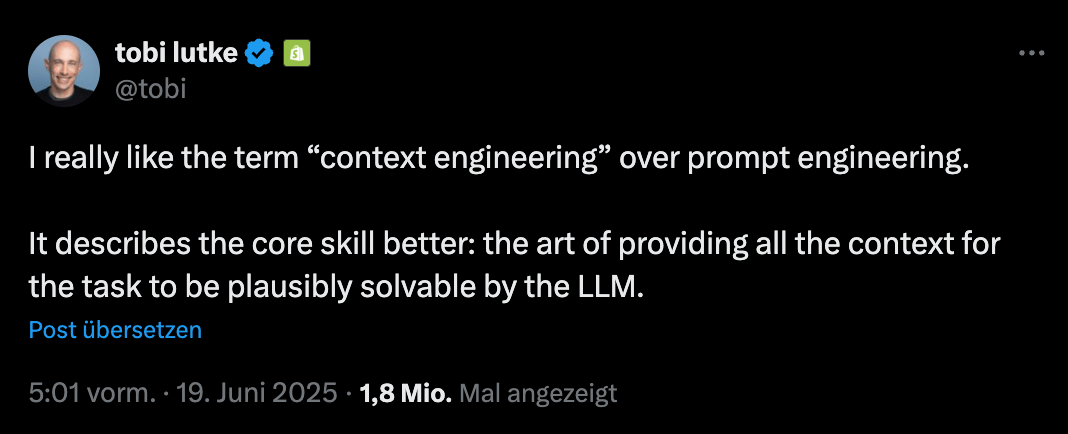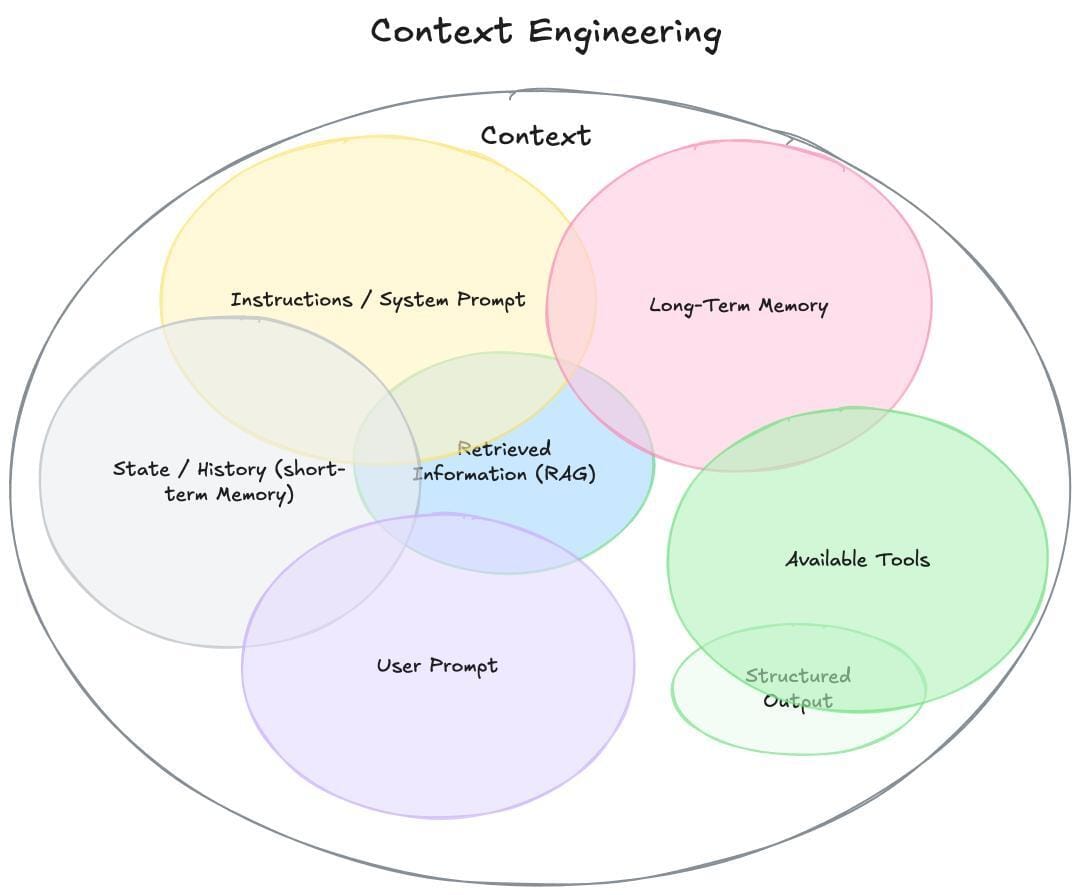- Human in the Loop
- Posts
- #6 Edition: Why Context Engineering Is the Missing Skill for Building AI Agents
#6 Edition: Why Context Engineering Is the Missing Skill for Building AI Agents
PLUS: Big news from OpenAI, Claude and Replit

Hey, it’s Andreas.
Welcome back to Human in the Loop — your field guide to what’s next in AI, agents, and automation.
This week’s edition is packed:
Warmwind drops an AI-first OS for autonomous workflows, OpenAI launches a Deep Research API for knowledge synthesis, and Claude adds Hooks to power custom agent automation.
We will look into why everyone’s talking about Context Engineering — and why it’s becoming the critical skill for building reliable, high-performing AI agents.
and much more…
Let’s get into it.

Weekly Field Notes
🧰 Industry Updates
New drops: Tools, frameworks & infra for AI agents
🌀 Warmwind launches an AI-first OS for fully autonomous workflows
→ AI-native operating system built entirely around agentic execution.
🌀 Warp 2.0 delivers agentic development environment for multi-agent workflows
→ Full-stack IDE designed for coordinating multiple agents across dev workflows.
🌀 Cursor brings AI coding agents to mobile and web platforms
→ Cross-platform rollout expands accessibility of their agent-native coding assistant. I am a big fan of Cursors and great to see them keep delivering.
🌀 Replit upgrades agents with Dynamic Intelligence for advanced reasoning
→ Improves multi-hop capabilities, memory integration, and long-term planning.
🌀 Hcompany open-sources HOLO-1 for visual UI navigation and automation
→ A visual agent that interacts directly with your desktop UI — powerful for RPA-style workflows.
🌀 Vercel tests new agent in beta to analyze app performance and security
→ AI-native observability play that merges dev tooling with agent reasoning.
🌀 Claude Code adds Hooks for user-defined automation in agent workflows
→ Users can now define custom automation routines tied to Claude agent outputs.
🌀 OpenAI rolls out a Deep Research API for automated knowledge synthesis
→ Aimed at power users and enterprise analysts, pricing suggests heavy compute and high capability.
🎓 Learning & Upskilling
Sharpen your edge - top free courses this week
📘 CrewAI solid community tutorial
→ A solid hands-on community tutorial that takes you from agent basics to coding ReAct agents and building your first multi-agent system using CrewAI.
📘 IBM launched new certification: Artificial Intelligence Fundamentals Speciality
→ A full-spectrum learning path from AI basics to LLMs and agentic systems. Covers machine learning, deep learning, NLP, AI governance, and real-world implementation strategies — ideal for those building career-ready foundations in AI (training a free, but to do the exam you need to pay a small fee).
P.S. Got a good new course? Send it my way on LinkedIn or just hit reply.
🌱 Mind Fuel
Strategic reads, enterprise POVs and research
🔹 Goldman Sachs predicts 20% software market growth driven by AI agents
→ Highlights platform shift toward agent-powered enterprise software.
🔹 University of Oxford on Deep Research Agents
→ Super comprehensive systematic examination and roadmap.
🔹 IBM paper on benchmarking the AI advantage in finance
→ TL;DR: Mature AI adopters in finance cut costs, speed up processes, and redeploy talent to higher-value tasks—achieving 33% faster budgeting and 25% lower invoice costs. Yet most CFOs are still lagging, with fewer than 30% using AI effectively and only 13% tapping into generative AI for core processes.
🔹 McKinsey & Company highlights AI agents' role in managing complex healthcare workflows
→ Signals growing maturity of agent deployment in regulated industries.
🔹 Accenture CAIO outlines enterprise path to multi-agent systems
→ Accenture’s CAIO says the real shift is from single agents to multi-agent systems that coordinate like human teams. Enterprises that delay risk missing the inflection point — as standards like MCP and A2A accelerate scalable deployment.
🔹 QuantumBlack (McKinsey) scales reuse via MCP and Brix asset registry.
→ They cut discovery time by 55% and now treat reusable agent assets like code and pipelines.
🔹 Letta powers Bilt’s million-agent recommendation system for hyper-personalization
→ A look into scalable agent architecture for consumer personalization.
🔹 Cloudflare blocks default access for AI crawlers to protect content
→ Highlights growing tension between content providers and AI agents.

♾️ Thought Loop
What I've been thinking, building, circling this week
The hottest topic in AI right now? Context Engineering.
It’s not about writing better prompts. It’s about designing everything that surrounds the prompt — background, memory, examples, tools, structure, and flow.
The whole discussion hit peak attention when Shopify CEO Tobi Lütke tweeted in support of context engineering — calling it a more accurate description of how we enable models to reason:
And then Karpathy jumped in — agreeing, amplifying the point, and making it clear in a longer post: “It’s more art than tech.”
From that on the conversation exploded overnight — triggered by this short exchange on X between Shopify CEO Tobi Lütke and Karpathy.
And context engineering went from niche topic to front-page conversation. And it’s no coincidence this shift is happening now — AI agents are on the rise, and context is what makes or breaks them.
Because the most important factor in whether an agent succeeds isn’t the model. It’s the quality of the context you load into its (very limited) working memory.
When agents fail, it’s rarely because the model lacks power. It’s because they were asked to decide with the wrong — or incomplete — context.
So what exactly is context?
It’s not just the prompt you type. It’s everything the model sees before it generates a response — including:
→ Instructions – system prompts, rules, behavior guides
→ User input – the immediate task or query
→ Short-term memory – previous messages and interactions
→ Long-term memory – persistent facts, past interactions, user preferences → Retrieved knowledge – external facts from tools, documents, databases (RAG)
→ Available tools – what the model can do (e.g. send_email, get_weather)
→ Structured output schema – how the model should respond (e.g. JSON, tables)
Unlike prompt engineering, which is about writing a clever sentence, context engineering is about designing a system.
A system that provides the right information, in the right format, at the right time — so the model can actually perform.
To put it simply: Context engineering is a discipline focused on designing dynamic systems — systems that deliver the right information, in the right format, at the right time, so the LLM has exactly what it needs to complete the task.
It’s not just about what you say to the model. It’s about everything the model sees, knows, and can access before it takes action.
And that makes context engineering the real operating system for AI agents.

🔧 Tool Spotlight
A tool I'm testing and wachting closely this week
Glass by Pickle — is an invisible desktop agent with real-time context awareness.
This one caught my attention. It’s fast, light, open-source — and feels like an actual mind extension, not just another wrapper.
How it works:
→ Runs locally on your Mac (Windows WIP)
→ Sees your screen, listens to meetings, and understands what’s going on
→ Summarizes, recalls, and answers — based on what you’ve already done
→ Never shows up in recordings, screenshots, or your dock
→ No spyware nonsense — fully private, zero hidden capture
Built on top of CheatingDaddy, but getting a full modular refactor. The team seems very serious — clean commits, transparent roadmap, and already supports OpenAI + Gemini APIs (local LLM support coming).
You can:
→ Launch instantly via Mac app
→ Or clone and run locally with Node/Python
→ Use your own API key, or theirs (free tier available)
→ Ask the AI questions based on what you just saw/heard
→ Get live summaries and action items in meetings
→ All with Cmd + \ or Cmd + Enter
Still early, still raw — but promising and fun to play around.
→ Explore Pickle on GitHub

That’s it for today. Thanks for reading.
Enjoy this newsletter? Please forward to a friend.
See you next week and have an epic week ahead,
— Andreas

P.S. I read every reply — if there’s something you want me to cover or share your thoughts on, just let me know!
How did you like today's edition? |



